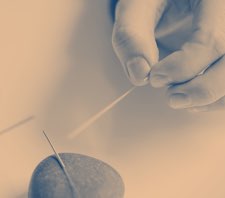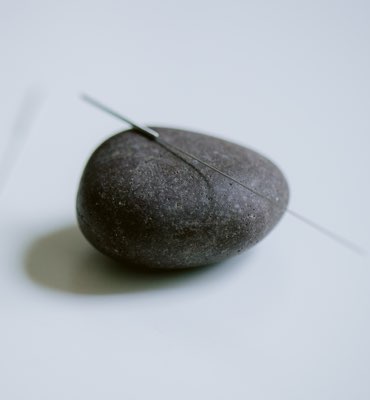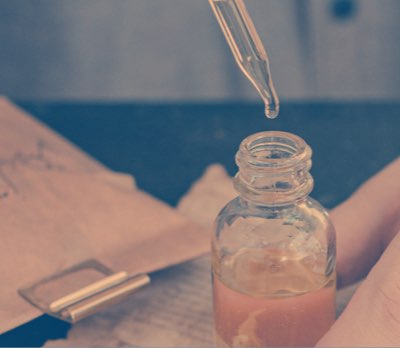FAQ
Acupuncture treats health conditions by stimulating “acu-points” found at specific locations on the surface of the body. Acupuncturists use a complex system of diagnostic methods that take into consideration the person as a whole, discerning the body’s pattern of disharmony rather than simply treating the symptoms. The goal is not only to alleviate symptoms but more importantly to treat the underlying cause.

Oriental Medicine is a healing art of over 2,500 years and is based on a system of diagnosis of disease prevention, health and well-being. The basis of this method is founded on the principal Qi and defined pathways (meridians) of energy flowing through the body. Pain and illness are the result of disruption of the Qi. This can be due to injury, stress, poor diet, medications or other conditions. With the understanding that the body has the ability and the intelligence to heal itself when given the right input, the intention is to restore the flow of Qi in the body. This network connects every organ and part of the body, providing balance and regulation of physiological processes.
Acupuncture is a very effective form of medical treatment that throughout the years has evolved into a complete holistic health care system. Practitioners of Traditional Chinese Medicine have used this noninvasive treatment method to help millions of people become well and stay well.
Acupuncture Explained in 90 seconds
*It’s not easy for anyone to sum up several thousand years of acupuncture in a short video, but this is a start. Hope you enjoyed it.
What is Qi? (Pronounced Chee)
At the very core of this ancient medicine is the philosophy that Qi (pronounced “chee”), or life energy, flow throughout the body. Qi helps to protect the body from illness, pain and disease. A personç—´ health is influenced by the quality, quantity and balance f Qi. Qi circulates through pathways called meridians. There are 14 main meridians and each is connected to a specific organ. Meridian pathways are like rivers. Where a river flows it transports life-giving water that nourishes the land, plants and people. In this same way, meridians transport life giving Qi to nourish and energize every cell, organ, gland, and tissue.
What can affect Qi?
There are many things that can affect the quality, quantity and balance of Qi. Physical and emotional trauma, stress, lack of exercise, overexertion, seasonal changes, diet, accidents, or excessive activity can lead to imbalance or blockage of Qi.
Under normal circumstances the body can naturally bounce back and return to a state of health. When the disruption of Qi is excessive, or if the body is weak, then illness, pain or disease can follow
What will my acupuncturist do?
A full health history will be taken during your initial exam. Your acupuncturist will ask several questions regarding your health and lifestyle. They will most likely feel your pulse and look at your tongue and may conduct a physical exam. This information is then organized to create a complete and comprehensive Chinese medical diagnosis of where the Qi has become blocked or imbalanced. A typical acupuncture treatment will usually last 45 to 90 minutes.
Why do they want to feel my pulses?
There are 12 different pulse positions that your acupuncturist will palpate on each wrist. Each position corresponds to a specific organ and meridian. There are many qualities that your acupuncturist will be looking for in your pulse that reflect overall health.
Why do they want to look at my tongue?
The tongue is a map of the body. It is a clear reflection of the general health of the organs and internal systems. Your acupuncturist will look at the color, shape, cracks and coating on your tongue.


How many treatments will I need?
The number of treatments that one may need will vary from person to person. Some patients experience immediate relief; others may need a series of treatments to achieve results. As a general rule chronic conditions usually take longer to resolve than acute ones. Plan on a minimum of a month to see significant changes.
What should I expect during a treatment?
Where the acupuncture needle is inserted, you may experience a dull ache, numbness or heaviness. Often times one will experience a feeling of energy spreading or moving around the needle. This is called the “Qi” sensation. All of these reactions are a good sign that the point is being activated and that the treatment is working.
Do the needles hurt?
The sensation caused by an acupuncture needle varies. Some people may feel a very slight pain as the needle is inserted, but most people feel no pain at all. The needles are very small about the size of a cat’s whisker or a human hair.
How Safe is acupuncture?
Acupuncture is extremely safe. It is an all-natural, drug-free holistic therapy yielding no side effects except a feeling of relaxation and well-being. There is very little danger of infection from the needles as they are always sterile, single use needles that are then discarded.
What is miconeedling and is it safe?
Microneedling is a cosmetic procedure that involves using fine needles to create tiny punctures in the skin, stimulating collagen production and improving skin texture and appearance. It is considered safe when performed by a trained professional, with minimal side effects like redness and mild irritation, though risks such as infection or scarring may occur if done improperly by a non-licensed professional or on compromised skin. We do not suggest DIY home treatments.
We offer microneedling services and clients love the results.
*In California, only licensed medical professionals are allowed to perform microneedling, including Acutpuctrists (L.Ac.), Physicians (MDs), and Nurse practitioners (NPs, PAs). Estheticians are Not certified.
What is Red Light Therapy (RLT)?
RLT is a non-invasive treatment that uses low-level red or near-infrared light to stimulate cellular regeneration, improve circulation, and reduce inflammation. It’s widely used for skin rejuvenation, pain relief, wound healing, and muscle recovery. RLT is generally considered safe, with minimal side effects like mild redness. Since it doesn’t involve UV light, it avoids the risks associated with sun exposure. To ensure safety, it’s important to follow recommended treatment guidelines and consult a healthcare provider if needed, especially for those with medical conditions or heightened light sensitivity.


